Types of Information Systems and Benefits of ERP in Business
VerifiedAdded on 2023/01/12
|8
|2392
|21
AI Summary
This article discusses the different types of information systems, including transactional processing systems, management information systems, executive information systems, decision support systems, and artificial intelligence systems. It also explores the benefits of ERP in business, such as cost reduction, improved planning and efficiency, customer service, and customization. The conclusion provides recommendations for effectively organizing and analyzing data and information in a systematic manner.
Contribute Materials
Your contribution can guide someone’s learning journey. Share your
documents today.
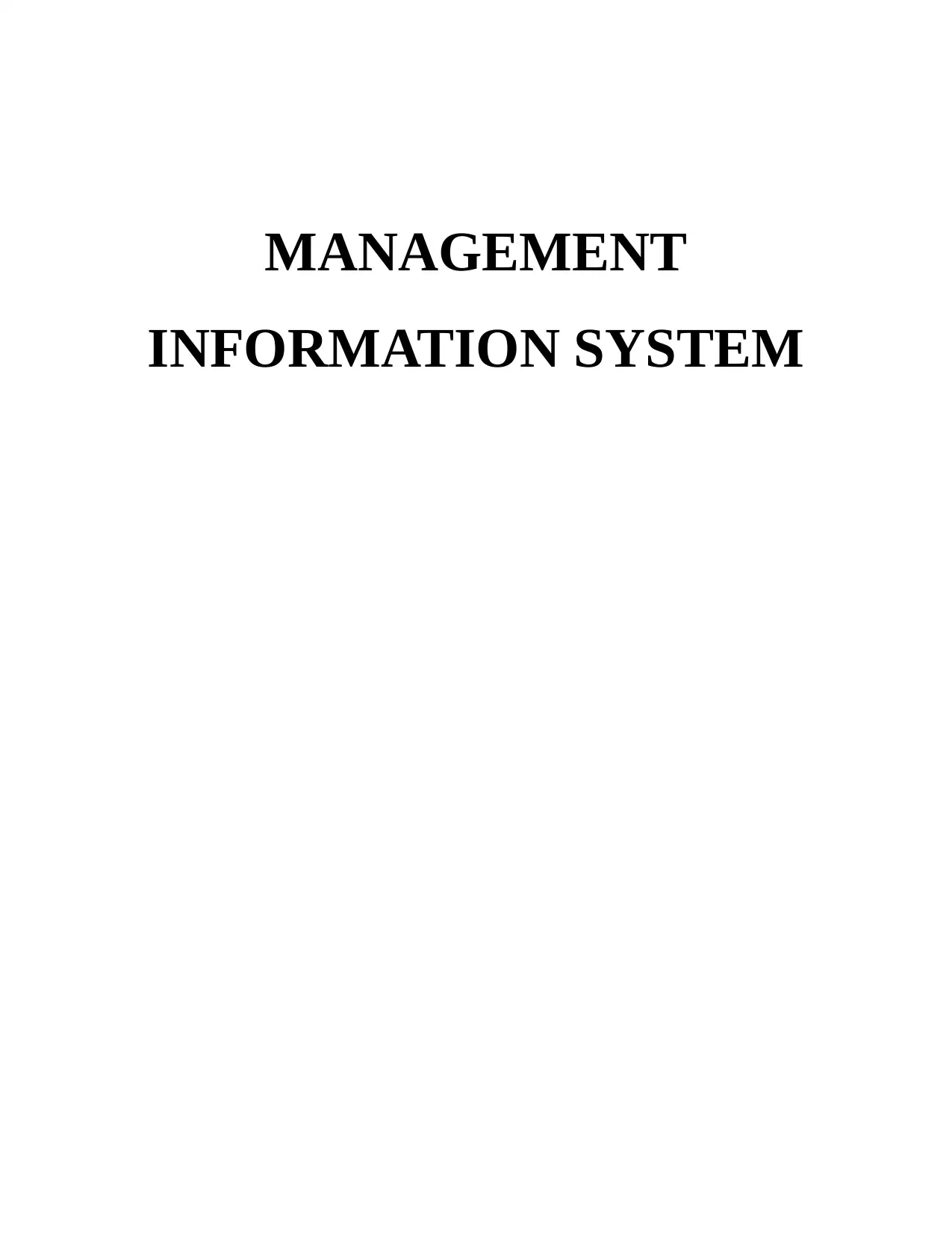
MANAGEMENT
INFORMATION SYSTEM
INFORMATION SYSTEM
Secure Best Marks with AI Grader
Need help grading? Try our AI Grader for instant feedback on your assignments.
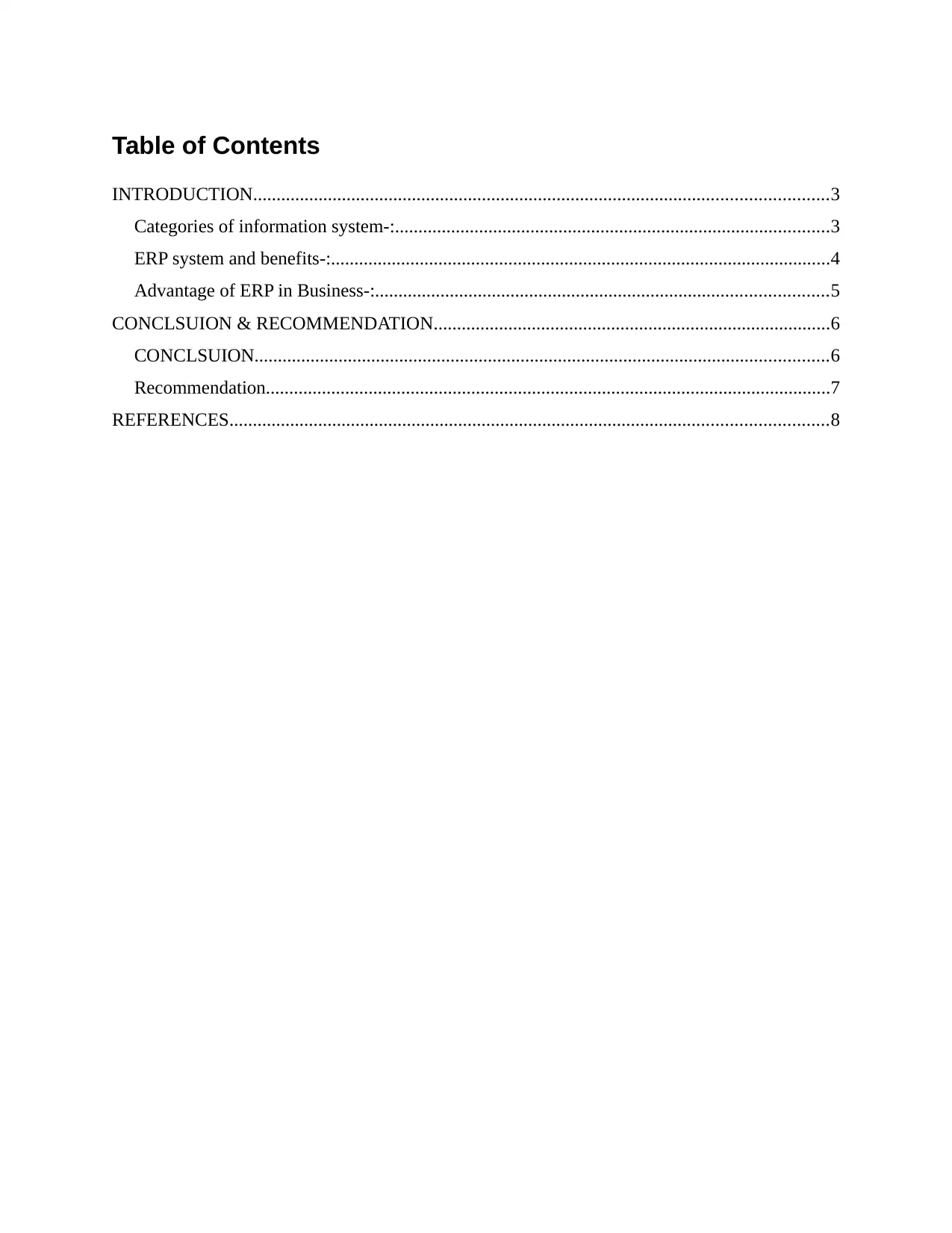
Table of Contents
INTRODUCTION...........................................................................................................................3
Categories of information system-:.............................................................................................3
ERP system and benefits-:...........................................................................................................4
Advantage of ERP in Business-:.................................................................................................5
CONCLSUION & RECOMMENDATION.....................................................................................6
CONCLSUION...........................................................................................................................6
Recommendation.........................................................................................................................7
REFERENCES................................................................................................................................8
INTRODUCTION...........................................................................................................................3
Categories of information system-:.............................................................................................3
ERP system and benefits-:...........................................................................................................4
Advantage of ERP in Business-:.................................................................................................5
CONCLSUION & RECOMMENDATION.....................................................................................6
CONCLSUION...........................................................................................................................6
Recommendation.........................................................................................................................7
REFERENCES................................................................................................................................8
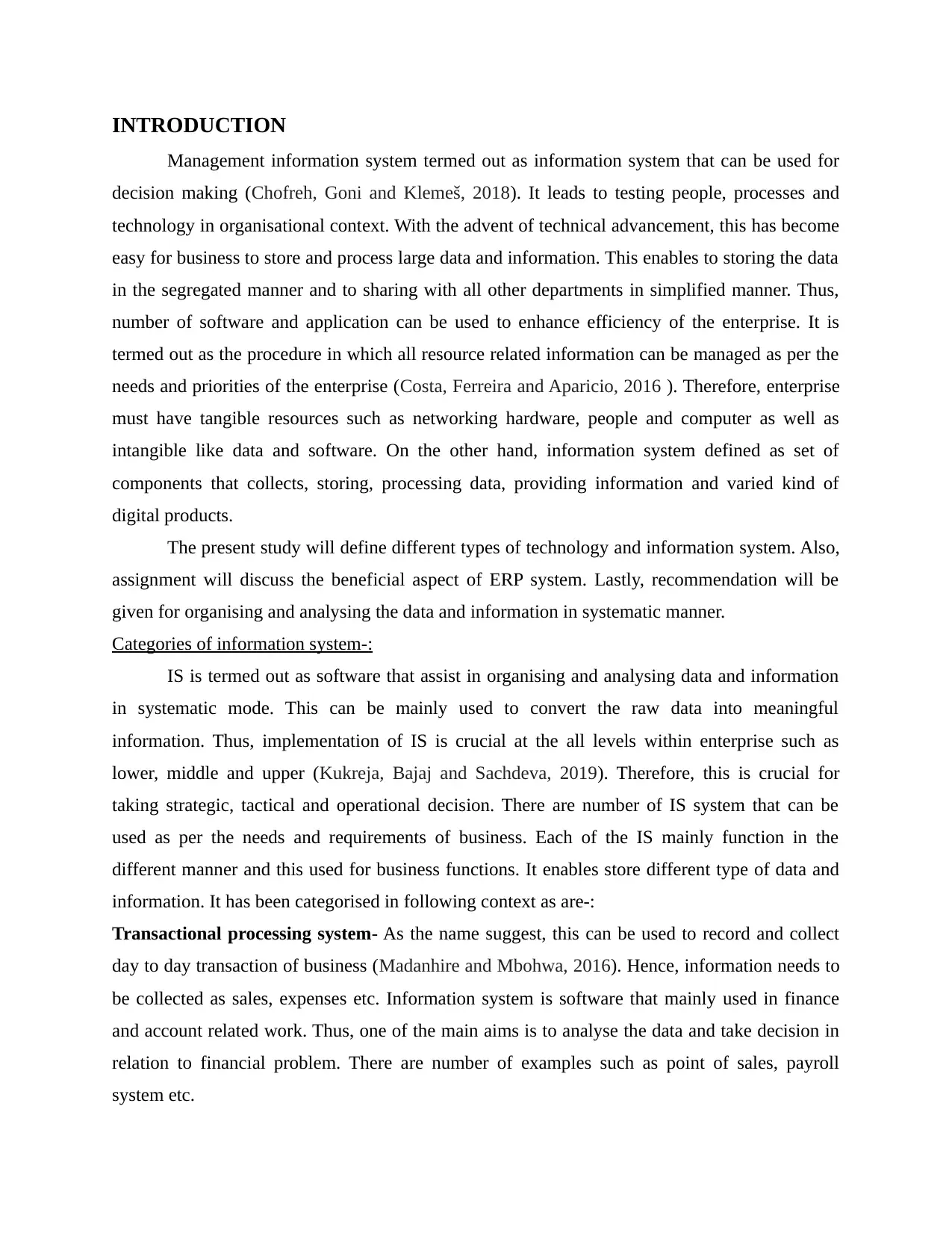
INTRODUCTION
Management information system termed out as information system that can be used for
decision making (Chofreh, Goni and Klemeš, 2018). It leads to testing people, processes and
technology in organisational context. With the advent of technical advancement, this has become
easy for business to store and process large data and information. This enables to storing the data
in the segregated manner and to sharing with all other departments in simplified manner. Thus,
number of software and application can be used to enhance efficiency of the enterprise. It is
termed out as the procedure in which all resource related information can be managed as per the
needs and priorities of the enterprise (Costa, Ferreira and Aparicio, 2016 ). Therefore, enterprise
must have tangible resources such as networking hardware, people and computer as well as
intangible like data and software. On the other hand, information system defined as set of
components that collects, storing, processing data, providing information and varied kind of
digital products.
The present study will define different types of technology and information system. Also,
assignment will discuss the beneficial aspect of ERP system. Lastly, recommendation will be
given for organising and analysing the data and information in systematic manner.
Categories of information system-:
IS is termed out as software that assist in organising and analysing data and information
in systematic mode. This can be mainly used to convert the raw data into meaningful
information. Thus, implementation of IS is crucial at the all levels within enterprise such as
lower, middle and upper (Kukreja, Bajaj and Sachdeva, 2019). Therefore, this is crucial for
taking strategic, tactical and operational decision. There are number of IS system that can be
used as per the needs and requirements of business. Each of the IS mainly function in the
different manner and this used for business functions. It enables store different type of data and
information. It has been categorised in following context as are-:
Transactional processing system- As the name suggest, this can be used to record and collect
day to day transaction of business (Madanhire and Mbohwa, 2016). Hence, information needs to
be collected as sales, expenses etc. Information system is software that mainly used in finance
and account related work. Thus, one of the main aims is to analyse the data and take decision in
relation to financial problem. There are number of examples such as point of sales, payroll
system etc.
Management information system termed out as information system that can be used for
decision making (Chofreh, Goni and Klemeš, 2018). It leads to testing people, processes and
technology in organisational context. With the advent of technical advancement, this has become
easy for business to store and process large data and information. This enables to storing the data
in the segregated manner and to sharing with all other departments in simplified manner. Thus,
number of software and application can be used to enhance efficiency of the enterprise. It is
termed out as the procedure in which all resource related information can be managed as per the
needs and priorities of the enterprise (Costa, Ferreira and Aparicio, 2016 ). Therefore, enterprise
must have tangible resources such as networking hardware, people and computer as well as
intangible like data and software. On the other hand, information system defined as set of
components that collects, storing, processing data, providing information and varied kind of
digital products.
The present study will define different types of technology and information system. Also,
assignment will discuss the beneficial aspect of ERP system. Lastly, recommendation will be
given for organising and analysing the data and information in systematic manner.
Categories of information system-:
IS is termed out as software that assist in organising and analysing data and information
in systematic mode. This can be mainly used to convert the raw data into meaningful
information. Thus, implementation of IS is crucial at the all levels within enterprise such as
lower, middle and upper (Kukreja, Bajaj and Sachdeva, 2019). Therefore, this is crucial for
taking strategic, tactical and operational decision. There are number of IS system that can be
used as per the needs and requirements of business. Each of the IS mainly function in the
different manner and this used for business functions. It enables store different type of data and
information. It has been categorised in following context as are-:
Transactional processing system- As the name suggest, this can be used to record and collect
day to day transaction of business (Madanhire and Mbohwa, 2016). Hence, information needs to
be collected as sales, expenses etc. Information system is software that mainly used in finance
and account related work. Thus, one of the main aims is to analyse the data and take decision in
relation to financial problem. There are number of examples such as point of sales, payroll
system etc.
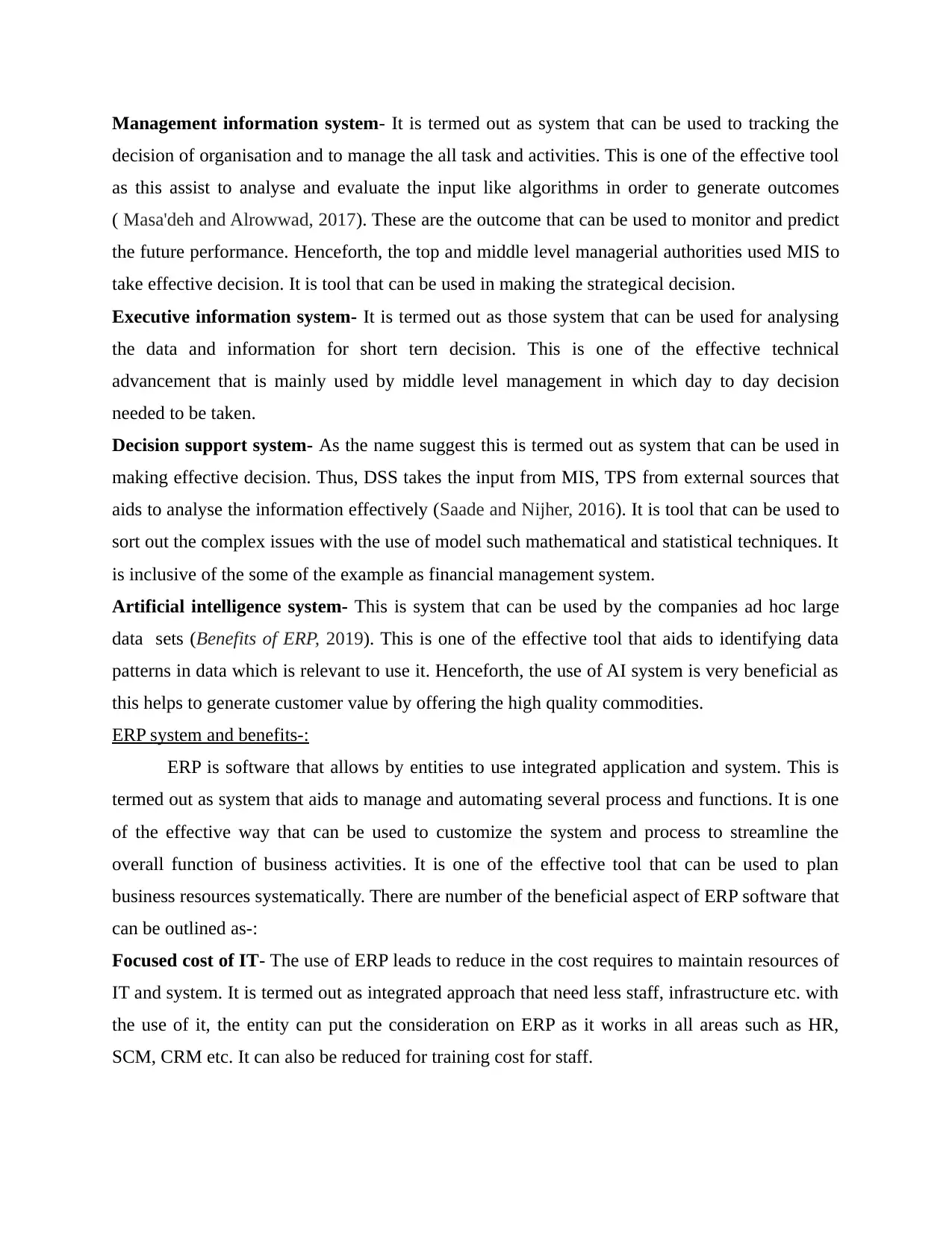
Management information system- It is termed out as system that can be used to tracking the
decision of organisation and to manage the all task and activities. This is one of the effective tool
as this assist to analyse and evaluate the input like algorithms in order to generate outcomes
( Masa'deh and Alrowwad, 2017). These are the outcome that can be used to monitor and predict
the future performance. Henceforth, the top and middle level managerial authorities used MIS to
take effective decision. It is tool that can be used in making the strategical decision.
Executive information system- It is termed out as those system that can be used for analysing
the data and information for short tern decision. This is one of the effective technical
advancement that is mainly used by middle level management in which day to day decision
needed to be taken.
Decision support system- As the name suggest this is termed out as system that can be used in
making effective decision. Thus, DSS takes the input from MIS, TPS from external sources that
aids to analyse the information effectively (Saade and Nijher, 2016). It is tool that can be used to
sort out the complex issues with the use of model such mathematical and statistical techniques. It
is inclusive of the some of the example as financial management system.
Artificial intelligence system- This is system that can be used by the companies ad hoc large
data sets (Benefits of ERP, 2019). This is one of the effective tool that aids to identifying data
patterns in data which is relevant to use it. Henceforth, the use of AI system is very beneficial as
this helps to generate customer value by offering the high quality commodities.
ERP system and benefits-:
ERP is software that allows by entities to use integrated application and system. This is
termed out as system that aids to manage and automating several process and functions. It is one
of the effective way that can be used to customize the system and process to streamline the
overall function of business activities. It is one of the effective tool that can be used to plan
business resources systematically. There are number of the beneficial aspect of ERP software that
can be outlined as-:
Focused cost of IT- The use of ERP leads to reduce in the cost requires to maintain resources of
IT and system. It is termed out as integrated approach that need less staff, infrastructure etc. with
the use of it, the entity can put the consideration on ERP as it works in all areas such as HR,
SCM, CRM etc. It can also be reduced for training cost for staff.
decision of organisation and to manage the all task and activities. This is one of the effective tool
as this assist to analyse and evaluate the input like algorithms in order to generate outcomes
( Masa'deh and Alrowwad, 2017). These are the outcome that can be used to monitor and predict
the future performance. Henceforth, the top and middle level managerial authorities used MIS to
take effective decision. It is tool that can be used in making the strategical decision.
Executive information system- It is termed out as those system that can be used for analysing
the data and information for short tern decision. This is one of the effective technical
advancement that is mainly used by middle level management in which day to day decision
needed to be taken.
Decision support system- As the name suggest this is termed out as system that can be used in
making effective decision. Thus, DSS takes the input from MIS, TPS from external sources that
aids to analyse the information effectively (Saade and Nijher, 2016). It is tool that can be used to
sort out the complex issues with the use of model such mathematical and statistical techniques. It
is inclusive of the some of the example as financial management system.
Artificial intelligence system- This is system that can be used by the companies ad hoc large
data sets (Benefits of ERP, 2019). This is one of the effective tool that aids to identifying data
patterns in data which is relevant to use it. Henceforth, the use of AI system is very beneficial as
this helps to generate customer value by offering the high quality commodities.
ERP system and benefits-:
ERP is software that allows by entities to use integrated application and system. This is
termed out as system that aids to manage and automating several process and functions. It is one
of the effective way that can be used to customize the system and process to streamline the
overall function of business activities. It is one of the effective tool that can be used to plan
business resources systematically. There are number of the beneficial aspect of ERP software that
can be outlined as-:
Focused cost of IT- The use of ERP leads to reduce in the cost requires to maintain resources of
IT and system. It is termed out as integrated approach that need less staff, infrastructure etc. with
the use of it, the entity can put the consideration on ERP as it works in all areas such as HR,
SCM, CRM etc. It can also be reduced for training cost for staff.
Secure Best Marks with AI Grader
Need help grading? Try our AI Grader for instant feedback on your assignments.
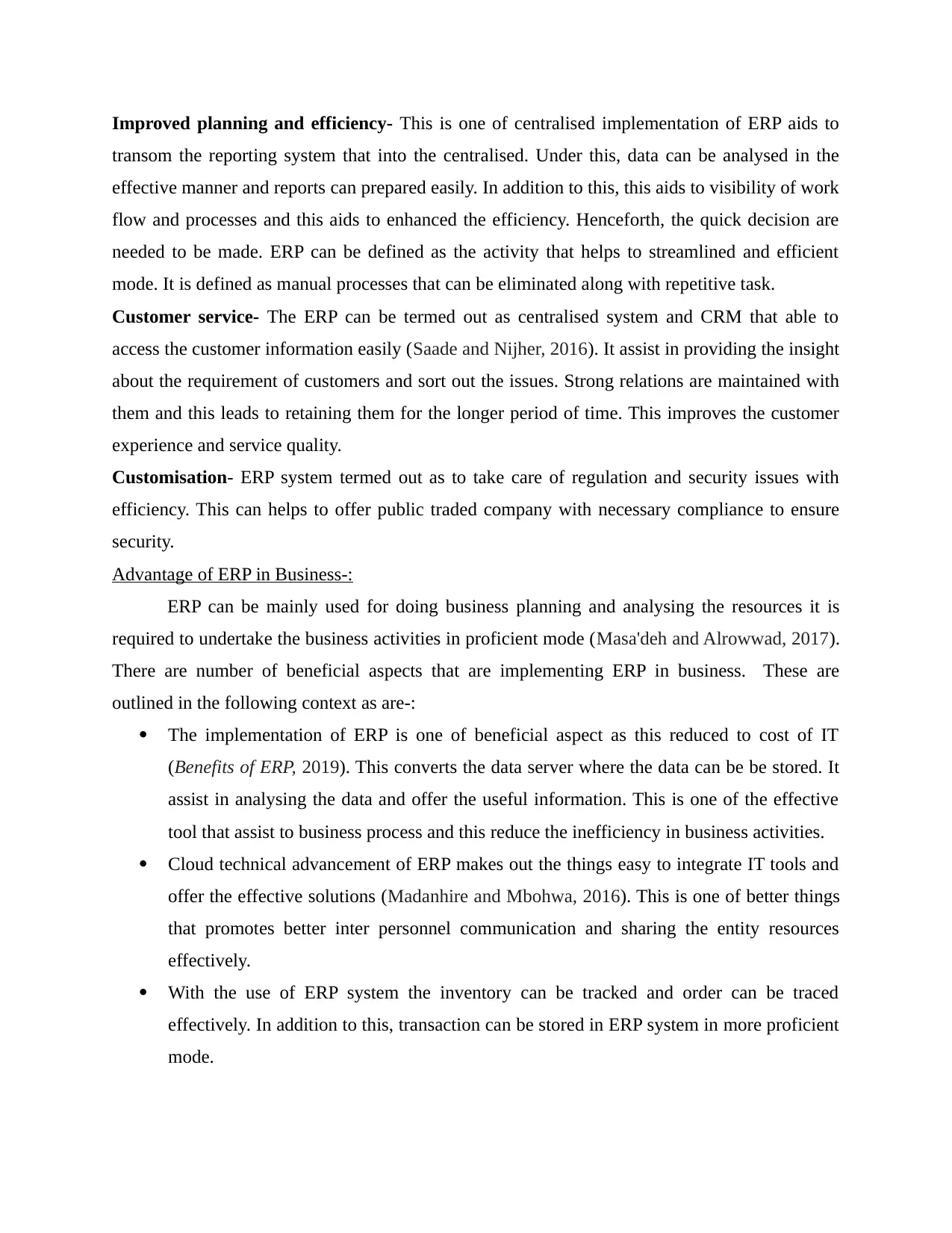
Improved planning and efficiency- This is one of centralised implementation of ERP aids to
transom the reporting system that into the centralised. Under this, data can be analysed in the
effective manner and reports can prepared easily. In addition to this, this aids to visibility of work
flow and processes and this aids to enhanced the efficiency. Henceforth, the quick decision are
needed to be made. ERP can be defined as the activity that helps to streamlined and efficient
mode. It is defined as manual processes that can be eliminated along with repetitive task.
Customer service- The ERP can be termed out as centralised system and CRM that able to
access the customer information easily (Saade and Nijher, 2016). It assist in providing the insight
about the requirement of customers and sort out the issues. Strong relations are maintained with
them and this leads to retaining them for the longer period of time. This improves the customer
experience and service quality.
Customisation- ERP system termed out as to take care of regulation and security issues with
efficiency. This can helps to offer public traded company with necessary compliance to ensure
security.
Advantage of ERP in Business-:
ERP can be mainly used for doing business planning and analysing the resources it is
required to undertake the business activities in proficient mode (Masa'deh and Alrowwad, 2017).
There are number of beneficial aspects that are implementing ERP in business. These are
outlined in the following context as are-:
The implementation of ERP is one of beneficial aspect as this reduced to cost of IT
(Benefits of ERP, 2019). This converts the data server where the data can be be stored. It
assist in analysing the data and offer the useful information. This is one of the effective
tool that assist to business process and this reduce the inefficiency in business activities.
Cloud technical advancement of ERP makes out the things easy to integrate IT tools and
offer the effective solutions (Madanhire and Mbohwa, 2016). This is one of better things
that promotes better inter personnel communication and sharing the entity resources
effectively.
With the use of ERP system the inventory can be tracked and order can be traced
effectively. In addition to this, transaction can be stored in ERP system in more proficient
mode.
transom the reporting system that into the centralised. Under this, data can be analysed in the
effective manner and reports can prepared easily. In addition to this, this aids to visibility of work
flow and processes and this aids to enhanced the efficiency. Henceforth, the quick decision are
needed to be made. ERP can be defined as the activity that helps to streamlined and efficient
mode. It is defined as manual processes that can be eliminated along with repetitive task.
Customer service- The ERP can be termed out as centralised system and CRM that able to
access the customer information easily (Saade and Nijher, 2016). It assist in providing the insight
about the requirement of customers and sort out the issues. Strong relations are maintained with
them and this leads to retaining them for the longer period of time. This improves the customer
experience and service quality.
Customisation- ERP system termed out as to take care of regulation and security issues with
efficiency. This can helps to offer public traded company with necessary compliance to ensure
security.
Advantage of ERP in Business-:
ERP can be mainly used for doing business planning and analysing the resources it is
required to undertake the business activities in proficient mode (Masa'deh and Alrowwad, 2017).
There are number of beneficial aspects that are implementing ERP in business. These are
outlined in the following context as are-:
The implementation of ERP is one of beneficial aspect as this reduced to cost of IT
(Benefits of ERP, 2019). This converts the data server where the data can be be stored. It
assist in analysing the data and offer the useful information. This is one of the effective
tool that assist to business process and this reduce the inefficiency in business activities.
Cloud technical advancement of ERP makes out the things easy to integrate IT tools and
offer the effective solutions (Madanhire and Mbohwa, 2016). This is one of better things
that promotes better inter personnel communication and sharing the entity resources
effectively.
With the use of ERP system the inventory can be tracked and order can be traced
effectively. In addition to this, transaction can be stored in ERP system in more proficient
mode.
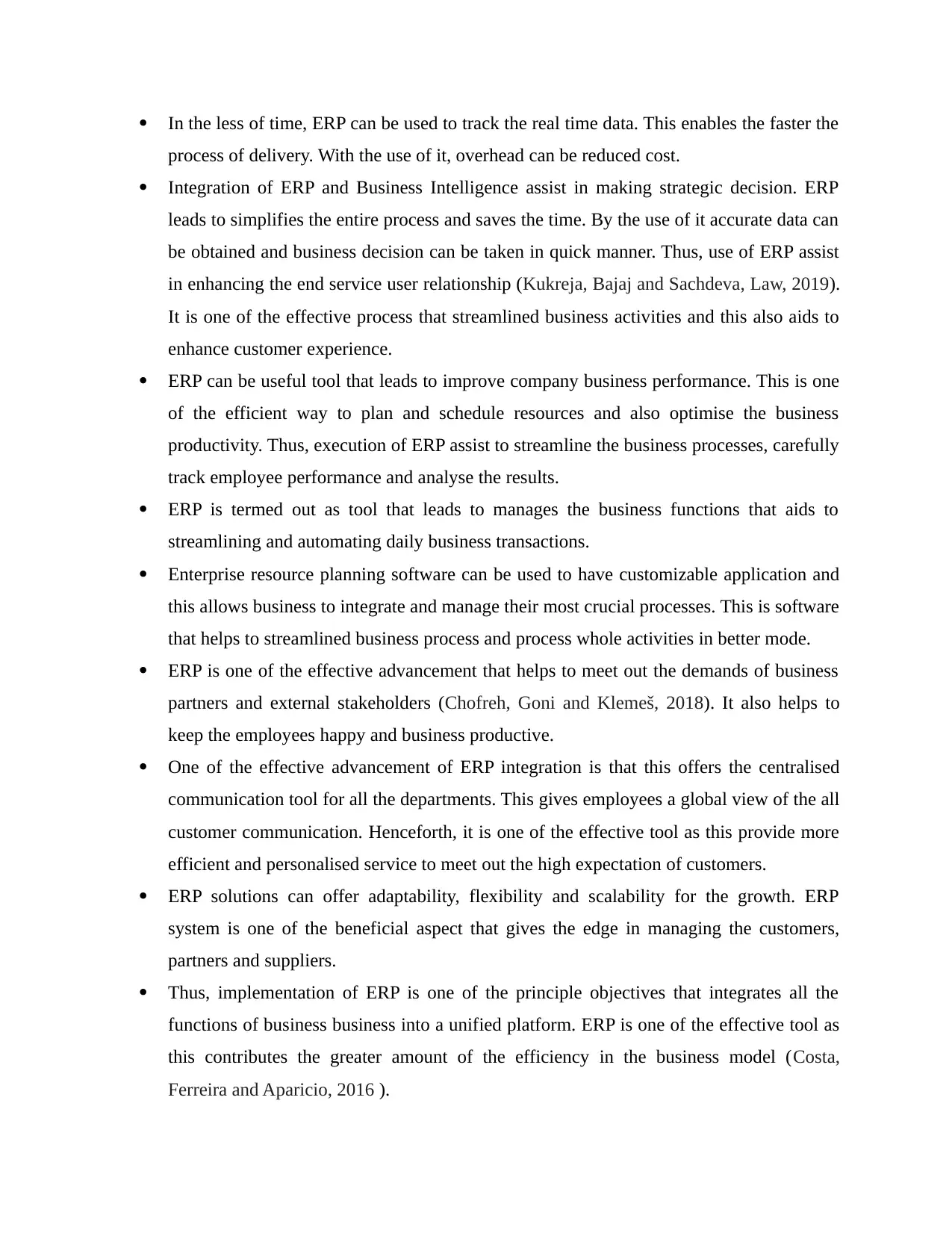
In the less of time, ERP can be used to track the real time data. This enables the faster the
process of delivery. With the use of it, overhead can be reduced cost.
Integration of ERP and Business Intelligence assist in making strategic decision. ERP
leads to simplifies the entire process and saves the time. By the use of it accurate data can
be obtained and business decision can be taken in quick manner. Thus, use of ERP assist
in enhancing the end service user relationship (Kukreja, Bajaj and Sachdeva, Law, 2019).
It is one of the effective process that streamlined business activities and this also aids to
enhance customer experience.
ERP can be useful tool that leads to improve company business performance. This is one
of the efficient way to plan and schedule resources and also optimise the business
productivity. Thus, execution of ERP assist to streamline the business processes, carefully
track employee performance and analyse the results.
ERP is termed out as tool that leads to manages the business functions that aids to
streamlining and automating daily business transactions.
Enterprise resource planning software can be used to have customizable application and
this allows business to integrate and manage their most crucial processes. This is software
that helps to streamlined business process and process whole activities in better mode.
ERP is one of the effective advancement that helps to meet out the demands of business
partners and external stakeholders (Chofreh, Goni and Klemeš, 2018). It also helps to
keep the employees happy and business productive.
One of the effective advancement of ERP integration is that this offers the centralised
communication tool for all the departments. This gives employees a global view of the all
customer communication. Henceforth, it is one of the effective tool as this provide more
efficient and personalised service to meet out the high expectation of customers.
ERP solutions can offer adaptability, flexibility and scalability for the growth. ERP
system is one of the beneficial aspect that gives the edge in managing the customers,
partners and suppliers.
Thus, implementation of ERP is one of the principle objectives that integrates all the
functions of business business into a unified platform. ERP is one of the effective tool as
this contributes the greater amount of the efficiency in the business model (Costa,
Ferreira and Aparicio, 2016 ).
process of delivery. With the use of it, overhead can be reduced cost.
Integration of ERP and Business Intelligence assist in making strategic decision. ERP
leads to simplifies the entire process and saves the time. By the use of it accurate data can
be obtained and business decision can be taken in quick manner. Thus, use of ERP assist
in enhancing the end service user relationship (Kukreja, Bajaj and Sachdeva, Law, 2019).
It is one of the effective process that streamlined business activities and this also aids to
enhance customer experience.
ERP can be useful tool that leads to improve company business performance. This is one
of the efficient way to plan and schedule resources and also optimise the business
productivity. Thus, execution of ERP assist to streamline the business processes, carefully
track employee performance and analyse the results.
ERP is termed out as tool that leads to manages the business functions that aids to
streamlining and automating daily business transactions.
Enterprise resource planning software can be used to have customizable application and
this allows business to integrate and manage their most crucial processes. This is software
that helps to streamlined business process and process whole activities in better mode.
ERP is one of the effective advancement that helps to meet out the demands of business
partners and external stakeholders (Chofreh, Goni and Klemeš, 2018). It also helps to
keep the employees happy and business productive.
One of the effective advancement of ERP integration is that this offers the centralised
communication tool for all the departments. This gives employees a global view of the all
customer communication. Henceforth, it is one of the effective tool as this provide more
efficient and personalised service to meet out the high expectation of customers.
ERP solutions can offer adaptability, flexibility and scalability for the growth. ERP
system is one of the beneficial aspect that gives the edge in managing the customers,
partners and suppliers.
Thus, implementation of ERP is one of the principle objectives that integrates all the
functions of business business into a unified platform. ERP is one of the effective tool as
this contributes the greater amount of the efficiency in the business model (Costa,
Ferreira and Aparicio, 2016 ).
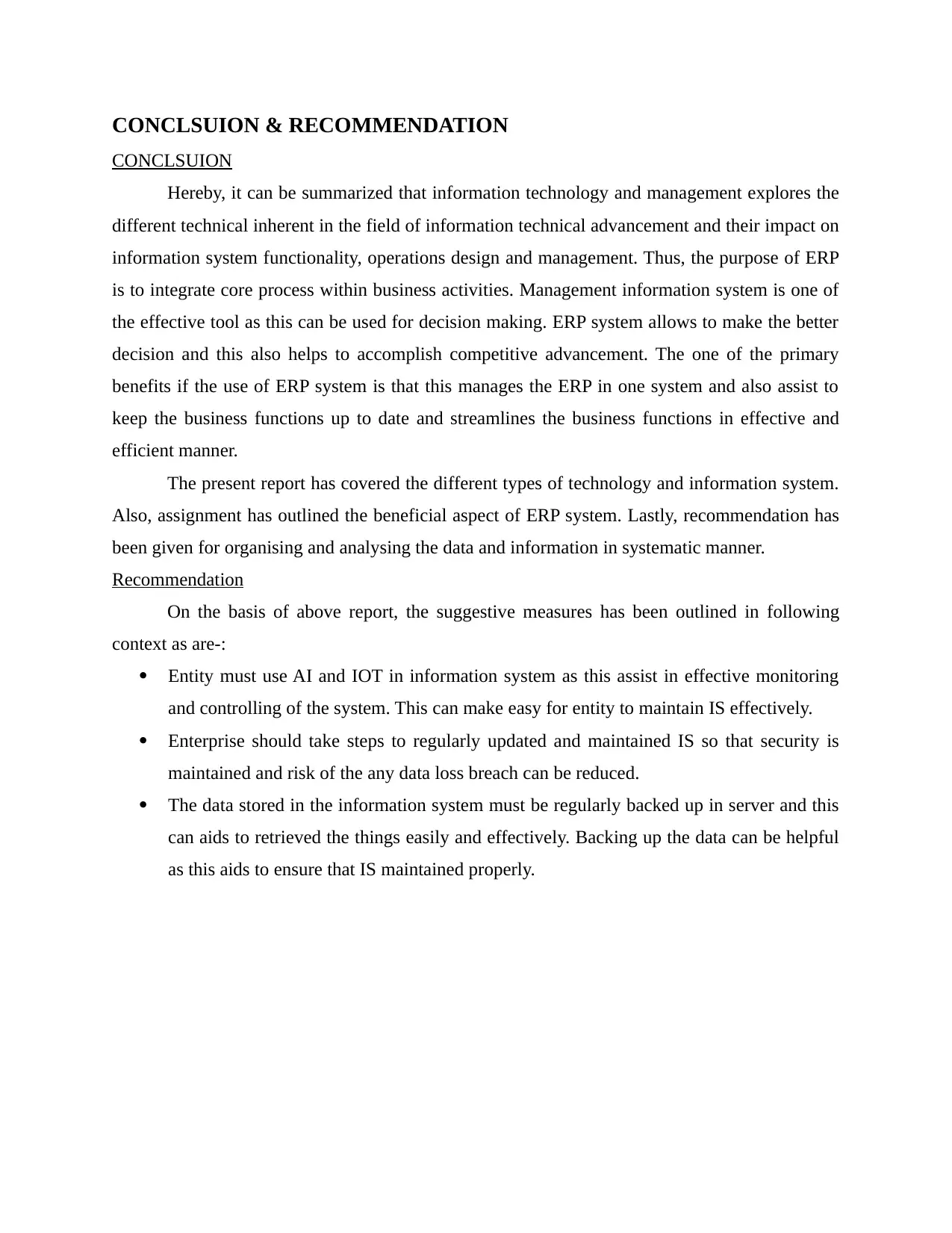
CONCLSUION & RECOMMENDATION
CONCLSUION
Hereby, it can be summarized that information technology and management explores the
different technical inherent in the field of information technical advancement and their impact on
information system functionality, operations design and management. Thus, the purpose of ERP
is to integrate core process within business activities. Management information system is one of
the effective tool as this can be used for decision making. ERP system allows to make the better
decision and this also helps to accomplish competitive advancement. The one of the primary
benefits if the use of ERP system is that this manages the ERP in one system and also assist to
keep the business functions up to date and streamlines the business functions in effective and
efficient manner.
The present report has covered the different types of technology and information system.
Also, assignment has outlined the beneficial aspect of ERP system. Lastly, recommendation has
been given for organising and analysing the data and information in systematic manner.
Recommendation
On the basis of above report, the suggestive measures has been outlined in following
context as are-:
Entity must use AI and IOT in information system as this assist in effective monitoring
and controlling of the system. This can make easy for entity to maintain IS effectively.
Enterprise should take steps to regularly updated and maintained IS so that security is
maintained and risk of the any data loss breach can be reduced.
The data stored in the information system must be regularly backed up in server and this
can aids to retrieved the things easily and effectively. Backing up the data can be helpful
as this aids to ensure that IS maintained properly.
CONCLSUION
Hereby, it can be summarized that information technology and management explores the
different technical inherent in the field of information technical advancement and their impact on
information system functionality, operations design and management. Thus, the purpose of ERP
is to integrate core process within business activities. Management information system is one of
the effective tool as this can be used for decision making. ERP system allows to make the better
decision and this also helps to accomplish competitive advancement. The one of the primary
benefits if the use of ERP system is that this manages the ERP in one system and also assist to
keep the business functions up to date and streamlines the business functions in effective and
efficient manner.
The present report has covered the different types of technology and information system.
Also, assignment has outlined the beneficial aspect of ERP system. Lastly, recommendation has
been given for organising and analysing the data and information in systematic manner.
Recommendation
On the basis of above report, the suggestive measures has been outlined in following
context as are-:
Entity must use AI and IOT in information system as this assist in effective monitoring
and controlling of the system. This can make easy for entity to maintain IS effectively.
Enterprise should take steps to regularly updated and maintained IS so that security is
maintained and risk of the any data loss breach can be reduced.
The data stored in the information system must be regularly backed up in server and this
can aids to retrieved the things easily and effectively. Backing up the data can be helpful
as this aids to ensure that IS maintained properly.
Paraphrase This Document
Need a fresh take? Get an instant paraphrase of this document with our AI Paraphraser
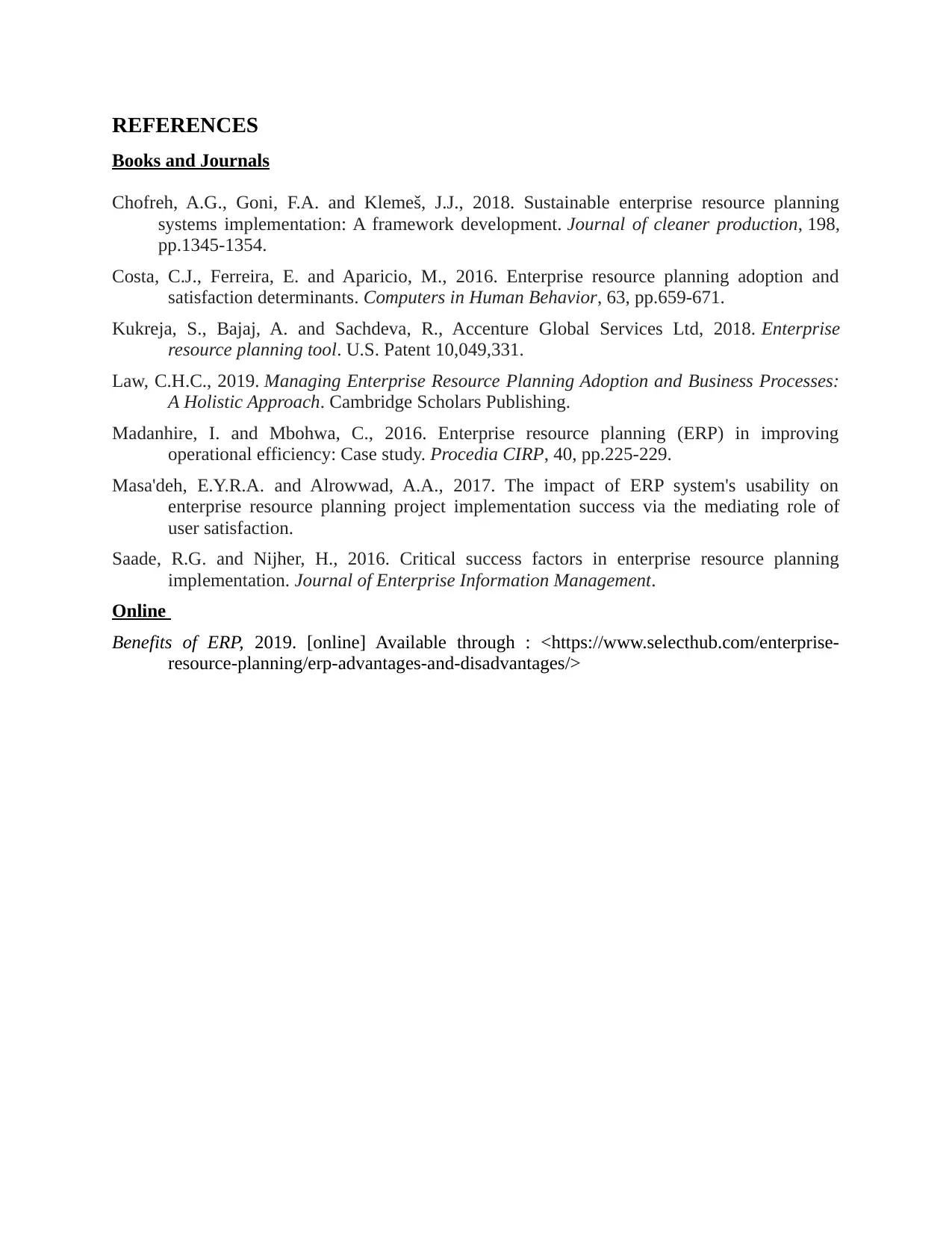
REFERENCES
Books and Journals
Chofreh, A.G., Goni, F.A. and Klemeš, J.J., 2018. Sustainable enterprise resource planning
systems implementation: A framework development. Journal of cleaner production, 198,
pp.1345-1354.
Costa, C.J., Ferreira, E. and Aparicio, M., 2016. Enterprise resource planning adoption and
satisfaction determinants. Computers in Human Behavior, 63, pp.659-671.
Kukreja, S., Bajaj, A. and Sachdeva, R., Accenture Global Services Ltd, 2018. Enterprise
resource planning tool. U.S. Patent 10,049,331.
Law, C.H.C., 2019. Managing Enterprise Resource Planning Adoption and Business Processes:
A Holistic Approach. Cambridge Scholars Publishing.
Madanhire, I. and Mbohwa, C., 2016. Enterprise resource planning (ERP) in improving
operational efficiency: Case study. Procedia CIRP, 40, pp.225-229.
Masa'deh, E.Y.R.A. and Alrowwad, A.A., 2017. The impact of ERP system's usability on
enterprise resource planning project implementation success via the mediating role of
user satisfaction.
Saade, R.G. and Nijher, H., 2016. Critical success factors in enterprise resource planning
implementation. Journal of Enterprise Information Management.
Online
Benefits of ERP, 2019. [online] Available through : <https://www.selecthub.com/enterprise-
resource-planning/erp-advantages-and-disadvantages/>
Books and Journals
Chofreh, A.G., Goni, F.A. and Klemeš, J.J., 2018. Sustainable enterprise resource planning
systems implementation: A framework development. Journal of cleaner production, 198,
pp.1345-1354.
Costa, C.J., Ferreira, E. and Aparicio, M., 2016. Enterprise resource planning adoption and
satisfaction determinants. Computers in Human Behavior, 63, pp.659-671.
Kukreja, S., Bajaj, A. and Sachdeva, R., Accenture Global Services Ltd, 2018. Enterprise
resource planning tool. U.S. Patent 10,049,331.
Law, C.H.C., 2019. Managing Enterprise Resource Planning Adoption and Business Processes:
A Holistic Approach. Cambridge Scholars Publishing.
Madanhire, I. and Mbohwa, C., 2016. Enterprise resource planning (ERP) in improving
operational efficiency: Case study. Procedia CIRP, 40, pp.225-229.
Masa'deh, E.Y.R.A. and Alrowwad, A.A., 2017. The impact of ERP system's usability on
enterprise resource planning project implementation success via the mediating role of
user satisfaction.
Saade, R.G. and Nijher, H., 2016. Critical success factors in enterprise resource planning
implementation. Journal of Enterprise Information Management.
Online
Benefits of ERP, 2019. [online] Available through : <https://www.selecthub.com/enterprise-
resource-planning/erp-advantages-and-disadvantages/>
1 out of 8
Related Documents
Your All-in-One AI-Powered Toolkit for Academic Success.
+13062052269
info@desklib.com
Available 24*7 on WhatsApp / Email
![[object Object]](/_next/static/media/star-bottom.7253800d.svg)
Unlock your academic potential
© 2024 | Zucol Services PVT LTD | All rights reserved.




